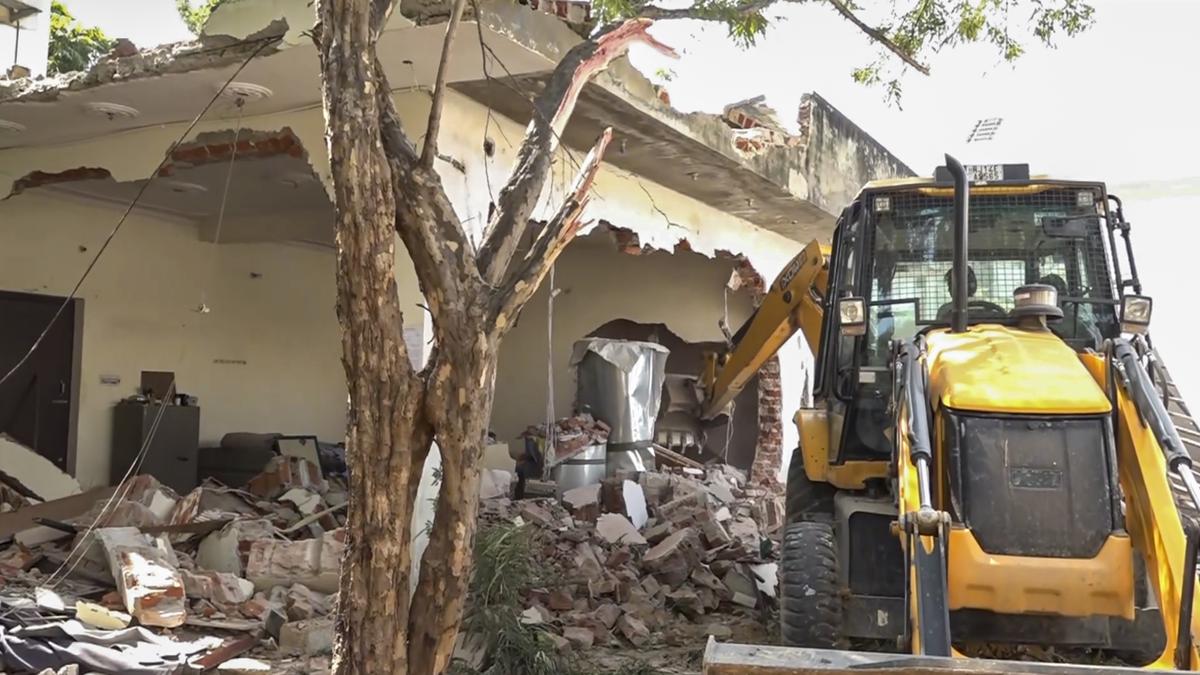
How the Supreme Court clamped down on ‘bulldozer’ demolition drives | Explained Premium
The Hindu
The Supreme Court issued a list of guidelines for authorities while issuing a strong message against the trend of “bulldozer justice.”
The Supreme Court on Wednesday (November 13, 2024) underscored that it is unconstitutional to demolish a person’s property without adhering to the due process of law, simply on the grounds of their alleged involvement in a crime. A Bench of Justices B.R. Gavai and K.V. Viswanathan issued a slew of guidelines to prevent illegal and retributive bulldozing of homes and private properties of accused persons by States. Earlier, the top court had extended its interim order halting demolitions across the country without express permission except for encroachments on public land or unauthorised structures.
Over the last few years, there has been an advent of communal and retributive bulldozing of homes and private properties of accused persons by States. In each of these cases, demolitions have been justified on account of action against encroachment or under the pretext of unauthorised construction. Such state-sanctioned acts of punitive violence have also been endorsed by several leaders of the ruling BJP and Hindutva supporters, who have hailed them as a form of “instant justice.”
What began with the bulldozer demolitions in Delhi’s Jahangirpuri in 2022 rapidly escalated and spread to other parts of the country. The violence that ensued in Nuh, Haryana, due to a clash between two religious groups in 2023, ended with the local administration demolishing a large number of homes in the neighbourhood. Similarly, communal riots in Khargone, Madhya Pradesh, led to the demolition of houses and businesses owned by Muslims, who were deemed to be “alleged rioters.”
According to a 2024 estimate by the Housing and Land Rights Network (HLRN), authorities at the local, State, and central levels demolished 153,820 homes in 2022 and 2023, displacing over 738,438 individuals across rural and urban areas of the country. Additionally, a report published in February by human rights group Amnesty International revealed that authorities in four BJP-ruled States and one Aam Aadmi Party-governed State demolished 128 structures—primarily belonging to Muslims—between April and June 2022.
The court’s verdict was delivered in response to a batch of petitions challenging demolition drives conducted by State governments in Rajasthan and Madhya Pradesh. These petitions were clubbed with another petition filed by Jamiat Ulama-i-Hind, a Muslim organisation, challenging the demolitions carried out in Jahangirpuri. On September 2, the two-judge Bench conveyed the intention to frame pan-India guidelines to address the petitioners’ concerns by invoking its inherent powers under Article 142 of the Constitution.
At the outset, the court asserted that constitutional ethos strictly prohibits the demolition of properties belonging to individuals, whether accused or convicted, without due process of law. It further underscored that such exercise of arbitrariness by government officials strikes at the very heart of the “rule of law” and undermines public trust. Cautioning against the executive usurping the judiciary’s role by preemptively punishing the accused, Justice Gavai observed, “The executive cannot become a judge and decide that a person accused is guilty and, therefore, punish him by demolishing his residential/commercial property/properties. Such an act of the executive would be transgressing its limits.”
Notably, the judges acknowledged that demolition drives not only target the alleged perpetrators of an offence but also impose a form of “collective punishment” on their families by destroying their place of dwelling. Justice Gavai pointed out that this offends the constitutional guarantee of the right to shelter under Article 21. “If his spouse, children, parents live in the same house or co-own the same property, can they be penalized by demolishing the property without them even being involved in any crime only on the basis of them being related to an alleged accused person? As is well known, a pious father may have a recalcitrant son and vice versa,” he candidly observed.

The Madurai Bench of the Madras High Court on Thursday (November 14, 2024) dismissed a petition filed by actor S. Kasthuri seeking anticipatory bail. Ms. Kasthuri had moved the court fearing arrest by the Madurai Police for her alleged remarks against the Telugu community during an event in Chennai earlier this month.










